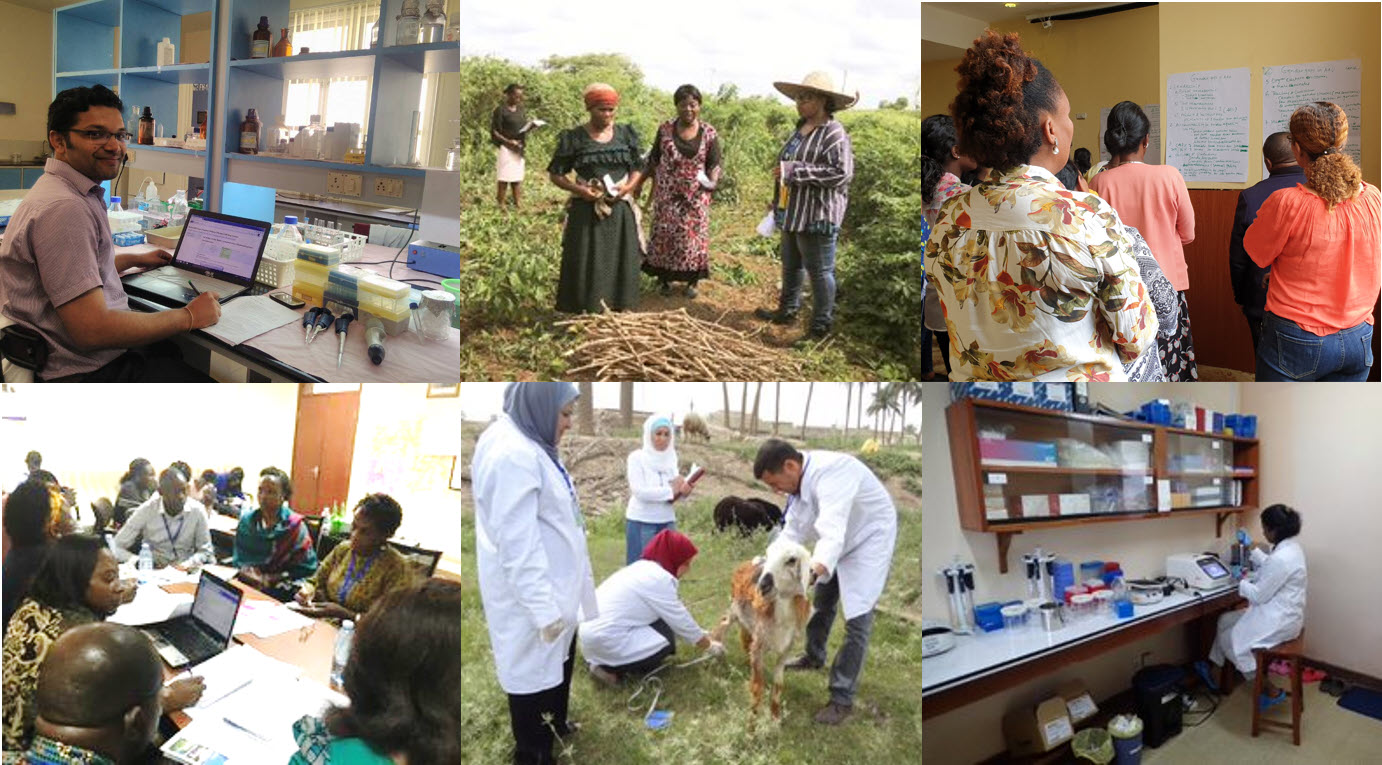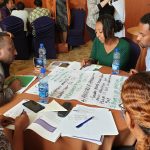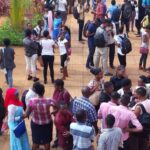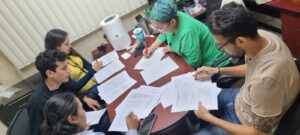
Enabling equitable knowledge ecosystems in Africa and Asia
In the second half of 2022 we undertook a self-evaluation of our Global Platforms for Equitable Knowledge Ecosystems (GPEKE) project. GPEKE’s high-level aim is to “enable the production and communication of quality, credible and relevant research by a more diverse range of individuals and institutions across Southern research systems”. The project includes strengthening INASP’s existing AuthorAID community platform and work with our country partners, Uganda National Council for Science and Technology (UNCST) and Ethiopian Academy of Sciences (EAS) to make research more visible, and research systems more responsive to gender.
We were keen to find out alongside our partners whether the project was achieving its aims, how we could do things better, and what lessons might be useful more widely.
The approach
We used a participatory approach called collaborative outcomes reporting (COR) and commissioned an external evaluation expert to ensure we collected rigorous, robust and objective evidence.
We used existing data and supplemented this with new data collected from a literature review, survey, stories of change, key informant interviews, and online focus-group discussions where necessary. The conclusions and recommendations were co-produced in workshops involving the evaluation team, country partners and other stakeholders.
We had four key questions:
- Is GPEKE addressing a real need and focusing on the right challenges?
- Is GPEKE delivering the expected results in the way that was expected?
- Is GPEKE being managed adaptively and strengthening partnerships?
- How could we and others seeking to strengthen knowledge ecosystems do it better?
The need
The literature, and evidence from partners and other stakeholders, confirmed that despite substantial investment over the last few decades, research capacity and research career opportunities remain critical challenges in the Global South, especially for women.
Researchers find it hard to access training and other resources and higher education institutes have limited capacity and resources to create supportive research environments. But national organisations, and in particular our partners Uganda National Council for Science and Technology (UNCST) and Ethiopian Academy of Sciences (EAS), have clear strategies in place to address these challenges.
The results
We found strong evidence that GPEKE activities are strengthening the capacity of individuals to produce research, and that individual researchers are passing on the skills they acquire through AuthorAID to others in their institutions.
In addition the Ethiopian Gender Learning Forum (EGLF) in Ethiopia and the Gender Equity in Research alliance (GERA) in Uganda, established during GPEKE, are improving the environment for women researchers.
One story of change submitted by a researcher in Uganda for the evaluation described how AuthorAID had not only helped her to develop her own research skills but also helped her to train others, and that the Gender Equity in Research Alliance workshops were essential for sharing experiences and networking and motivating universities to improve gender equity.
Between 2019 and 2021 over 24,000 researchers, roughly half of whom were women participated in AuthorAID’s online courses with a completion rate of over 40% for men and 42% for women. According to feedback the courses are highly regarded.
One participant who had joined multiple online courses said: “These types of short courses offered by INASP [are] very helpful to me. This is very important to me as a teacher because always I’m looking for new information to give to my students in my teaching sessions”.
At country level GPEKE provided training to nearly 100 editors and librarians from a wide range of institutions in Uganda and Ethiopia and helped UNCST develop an online research platform – the National Research Repository of Uganda (NRU) which has had more than 2,000 submissions.
According to the National Information and Technology Authority of Uganda (NITA-U) this has “put a spotlight on the opportunities and possibilities that a more equitable research system could create [facilitating] new partnerships in academia, private research organisations; with actors within Uganda’s publishing community.”
GPEKE’s work to establish GERA in Uganda and EGLF in Ethiopia were widely cited as one of the big successes of the project. These initiatives included workshops with more than 200 participants from over 100 institutions in Uganda and Ethiopia which led to many new initiatives to promote gender equity in higher education according to members.
One Ethiopian participant said that “senior female researchers have shown high willingness and commitment to challenge the research system in the country” while another participant from Uganda said that “the platform] “led to significant change in skills development and awareness on gender and research in my life as an individual; and in at least four universities in Eastern region of Uganda”.
Furthermore, there is good evidence that GPEKE’s work with partners in Uganda and Ethiopia will be sustainable. Gender equity is now embedded in UNCST’s strategic plan and the Ugandan gender network GERA is now registered as an independent NGO. There is also strong commitment among stakeholders to continue the work in Ethiopia and the gender activities there have attracted funding from the Packard Foundation.
There is evidence from multiple sources GPEKE has contributed substantially to strengthened and more equitable research ecosystems in the Global South, even in countries where the only activities have been online.
AuthorAID courses are accessed by people globally including in countries and regions affected by conflict or unrest – for example Yemen and the Somali regions – and by displaced researchers. A total of 166 (84%) of the participants in the AuthorAID survey in Nigeria felt that AuthorAID services have improved relationships between students and faculty, 162 (83%) said that it has strengthened mentoring, research and learning, and 149 (78%) that it has strengthened research collaboration.
Management and partnerships
INASP emphasises equitable partnerships in all its work and there is strong evidence from multiple sources that this has been the case in GPEKE. Partners had grown out of collaborative work before GPEKE and were substantially involved in the initial design and continuous review and re-design of the project.
Participants in the focus groups in Ethiopia and Uganda felt that relationships have been particularly good, both at individual level and institutional level, as well as in the gender alliance and gender learning forum. In addition, INASP and our partners have had to be very adaptable and work creatively against the backdrop of the Covid 19 pandemic. which then led to a review of the theory of change, discussions with UNCST and EAS and re-shaping the project to align better with their priorities.
Doing it better
The full evaluation report contains specific lessons and recommendations for different users, but the overall conclusion of participants in the final evaluation workshops was that through a combination of online learning for researchers, and support to in-country organisations supporting research production and use, it is possible to contribute to improved individual and institutional capacity and increased research productivity.
But to achieve that it is necessary to address inequities in research ecosystems at global, national, institutional, and individual levels as well as stimulate practical initiatives and policies to promote gender equity in research. Online support should be based on the principles of effective digital learning design, accessible to all and well-connected to local knowledge ecosystem stakeholder. And it is essential that both women are men can participate in activities to address gender issues.
As a result of the evaluation INASP is actively discussing further collaboration with UNCST and EAS and looking for further funding separately and together and is working with the AuthorAID community to develop the range and depth of the resources and support it can provide.

 Previous Post
Previous Post Next Post
Next Post


